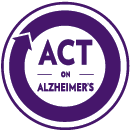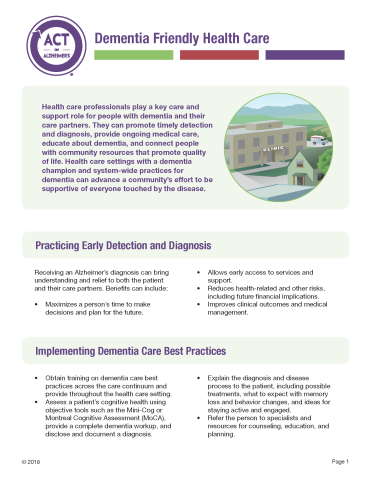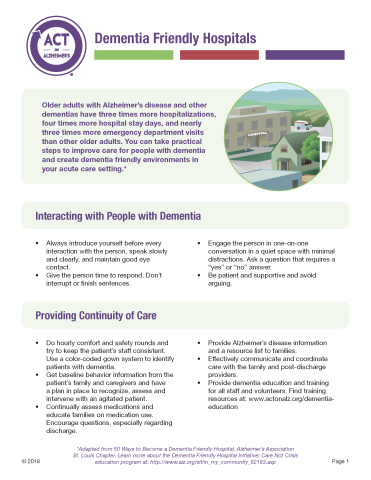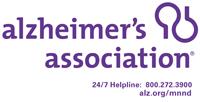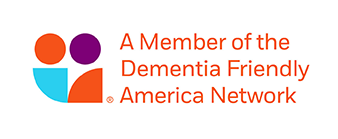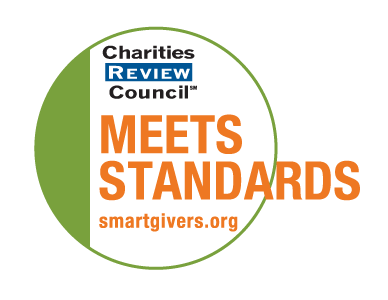SECTOR GUIDE
Health Care
Tips and best practices for early detection and using a coordinated, person-centered approach in health care.
Key Ideas
Health care professionals play key care and support roles for people with dementia and their care partners.
They can promote timely detection and diagnosis, provide ongoing medical care, educate about dementia, and connect people with community resources that promote quality of life.
Health care settings with a dementia champion and system-wide practices for dementia can advance a community’s effort to be supportive of everyone touched by the disease.
We have created a special guide for hospitals. Older adults with Alzheimer’s disease and other dementias have three times more hospitalizations, four times more hospital stay days, and nearly three times more emergency department visits than other older adults. You can take practical steps to improve care for people with dementia and create dementia-friendly environments in your acute care setting.
What's in the Sector Guide
- Promoting Early Detection and Diagnosis
- Implementing Dementia Care Best Practices
- Using a Coordinated, Person-Centered Approach
- Resources in Your Community
Resources
Assessing Cognitive Impairment in Older Adults: A Quick Guide for Primary Care Physicians
Becoming a Dementia Friendly Practice 6 step summary, Powerpoint, Patient letter from Wessex Academic Health Science Network and Dr. Nicola Decker.
Person-Centered Care for People with Dementia (powerpoint)
Alzheimer’s Disease Education and Referral Center Information for providers from National Institute on Aging, including: diagnostic guidelines, training materials, clinical trains, and research news.
Dementia Care: The Quality Chasm A white paper for family members, caregiver and professionals that describes a redesign of how we provide dementia care and how to shift to true person-centeredness.
Dementia Friendly Hospital Initiative (DFHI): Care Not Crisis Education program that fosters best care approaches and practice changes that result in "dementia friendly care" in hospital settings. DFHI addresses acute care staff's dementia specific awareness, as well as the knowledge, attitudes and behaviors that most affect adverse outcomes and enhance quality of care.
Physician's Guide to Assessing and Counseling Older Drivers
Dementia-Friendly Environment Resources
Is Your Health Care Center Dementia Friendly?
Information & Education for Patients & Their Families
Making available information and education about Alzheimer’s and related dementia for patients and their families is a key element in being a dementia capable community.
People diagnosed with dementia—and their caregivers—need education about the disease and care needs. They also need information about services and resources available in the community.
After a Diagnosis (ACT on Alzheimer's) Action steps and tips to share with individuals and their family when a diagnosis of Alzheimer's or dementia is made; includes resource information.
This Is Me Tool A tool for people with dementia to complete that lets health and social care professionals know about their needs, interests, preferences, likes and dislikes.
Taking Action Workbook: A Personal and Practical Guide for Persons with Mild Cognitive Impairment (MCI) and Early Alzheimer’s Disease This workbook is designed to be used by individuals living with MCI and early Alzheimer’s disease or a related disorder. It is a guide to help them learn about the changes they are facing and steps they can take to help themselves.
Living Well Workbook. A Guide for Persons with Mild Cognitive Impairments (MCI) & Early Dementia This workbook can be used alone or together with a partner. Each chapter includes information about a wellness strategy, its benefits, perspectives of people living with MCI and early dementia, ideas that you can try, and a place for you to build your own living well plan.
What Happens Next? A booklet about being diagnosed with Alzheimer’s disease or a related disorder Early-stage individuals share their firsthand views about diagnosis, what to expect, how to talk with others about the disease, ways to cope in order to help others who also are facing the beginning stages of dementia, and available resources.

